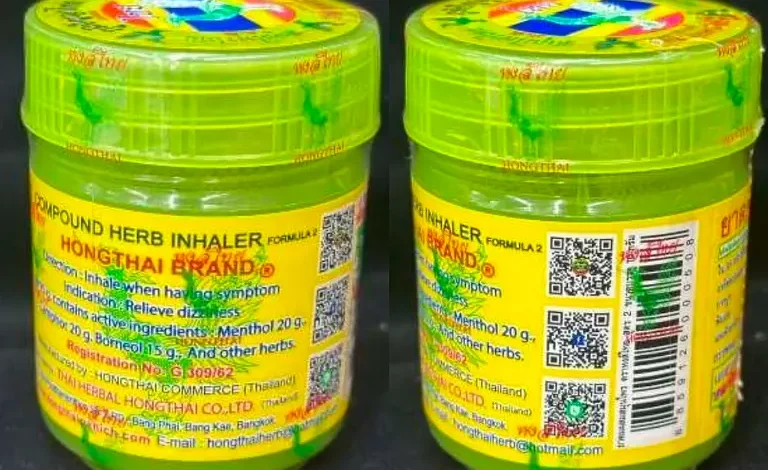
Popular Thai Inhaler Recall Over Dangerous Contamination Risk
Regulatory officials have issued a massive Thai inhaler recall after they found that there was dangerous microbial contamination in a popular aromatherapy product. The Food and Drug Administration’s testing revealed that a batch of Hong Thai Herbal’s Formula 2 brand of herbal inhaler failed to meet required safety standards. The products showed excessive microbial counts, combined yeasts and mold counts, and contained the potentially harmful Clostridium Spp bacteria.
The portable aromatherapy products, known locally as “yadom,” are accessible to more people throughout Southeast Asia and help treat nasal congestion, dizziness, and motion sickness. The FDA started collecting samples of various inhaler brands for testing when online reports emerged in May about fungal contamination that could harm users’ lungs. The testing results painted a concerning picture – 39 out of 54 inhaler samples tested in fiscal 2025 proved to be substandard. This recall now affects approximately 200,000 units from batch number 000332, which raises serious concerns about consumer safety.
What should consumers know about the Thai inhaler recall
Image Source: Nation Thailand
“For distributors or customers who may still possess products from this batch, the company is pleased to accept returns and offer full refunds, along with new replacement products in equal quantity at no additional cost.” — Teerapong Rabueathum, Founder, Thai Herbal Hong Thai Ltd.
The recall of Thai inhalers only affects one specific batch of Hong Thai Herbal Inhaler Formula 2. You should check your products right away for batch number “000332,” which was manufactured on December 9, 2024, and expires on December 8, 2027. This contaminated batch has exactly 200,000 units. All other Hong Thai products and formulas remain safe to use.
Thai Herbal Hong Thai Ltd. has started taking the affected units off the market. The company will destroy these recalled products on November 4, 2025, working together with the FDA.
Anyone who has inhalers from this compromised batch should stop using them right away. The manufacturer’s return process is simple and straightforward. You can return affected products to Hong Thai Panich at 434 Phutthamonthon Sai 2 Road, Bang Phai, Bang Khae, Bangkok 10160.
The company has several ways to contact them if you can’t visit in person. You can call 02-803-1549, 081-252-3406, 092-740-5500, or 092-740-7700 to arrange your refund. Every customer who returns contaminated products will get a full refund and replacement products from newly verified batches at no extra cost.
Lab tests showed the batch didn’t meet safety standards. It had too high levels of Total Aerobic Microbial Count, Total Combined Yeasts and Mold Count, and contained Clostridium spp..
How contamination was discovered and what it means
“Thai Herbal Hong Thai has also undertaken to enhance and strengthen its production processes, adding quality control measures at every stage of manufacturing, including ultraviolet (UV) sterilization, to guarantee that all future products released to the market are safe and meet regulatory standards.” — Teerapong Rabueathum, Founder, Thai Herbal Hong Thai Ltd.
Thailand’s Food and Drug Administration discovered the contamination problem during their regular inspections. They collected samples of the Hong Thai Herbal Inhaler Formula 2 from the manufacturing facility. The Department of Medical Sciences ran detailed lab tests that revealed troubling results – the product failed basic quality standards for microbial contamination.
The lab tests uncovered three serious safety issues. The product’s Total Aerobic Microbial Count and Total Combined Yeasts and Mold Count were above acceptable limits. They also found Clostridium spp. bacteria. Additional testing identified the specific strain as Clostridium perfringens, a bacteria typically found in soil.
Medical experts caution that these contaminants create serious health risks. The dangers are particularly high for elderly people and those with weak immune systems. People who inhale these contaminants could develop respiratory infections, experience breathing problems with wheezing, and suffer from coughing and sore throat.
The problems are systemic throughout the industry. The Department of Medical Sciences tested 54 inhaler samples in fiscal 2025, and 39 failed to meet standards. Thailand’s Herbal Product Act B.E. 2562 imposes strict penalties. Manufacturers of substandard herbal products face up to two years in jail and fines up to 200,000 baht. Sellers could get six months in prison and fines up to 50,000 baht.
Thai Herbal Hong Thai’s leaders plan to meet with the FDA to understand these findings better. They emphasized that their internal testing before registration never showed any problems.
Why the Hong Thai inhaler gained global popularity
Image Source: Amazon.in
Celebrity endorsements helped Hong Thai inhalers become a global sensation. Blackpink’s Thai-born Lisa Manoban boosted the brand’s popularity by a lot after featuring the product in several videos, including popular “What’s in My Bag?” segments. The product gained support from Hollywood actor Chris Hemsworth, British rapper Central Cee, K-pop singer Jung Yong-hwa, and Hong Kong singer Jackson Wang.
The inhaler’s popularity soared when a viral clip of Lisa using it created an instant social media trend. The product also appeared in the Thai Netflix series “Mad Unicorn,” where the female lead used it throughout multiple scenes.
Hong Thai’s sales numbers tell an impressive story. The company recorded sales of 300 million baht (approximately US$34.88 million) in 2023. Sales reached 350 million baht in 2024 alone.
The product’s smart design plays a big part in its soaring win. Users love its compact, rounded bottle that fits perfectly in hand and makes it easy to carry around. These inhalers are surprisingly affordable too, with each unit costing less than US$18.36.
Luxury hotels have jumped on this wellness trend. Bangkok’s Four Seasons Hotel offers guests tailored yadom experiences. The Mandarin Hotel in Bangkok welcomes guests with these inhalers.
This family’s secret recipe has transformed from a local Thai household item into a symbol of Thai soft power worldwide.
Safety concerns have emerged after tests revealed contamination in Hong Thai inhalers, shaking Thailand’s aromatherapy industry. These traditional Thai remedies have gained worldwide popularity, but this recall shows why strict quality control matters. The presence of harmful microbes, including Clostridium perfringens bacteria, creates serious health risks, especially when you have elderly users or people with weak immune systems.
Thai Herbal Hong Thai Ltd.’s response has been responsible. The company’s detailed recall process, plans to destroy affected batches, and commitment to improved production standards demonstrate this. The whole ordeal points to systemic problems in the sector, as tests showed that 72% of inhalers failed to meet safety requirements. Hong Thai’s soaring success through celebrity backing and cultural significance doesn’t change the fact that consumer safety comes first.
The product’s rise as a symbol of Thai soft power stands in stark contrast to its current quality issues. Users need to check batch information carefully before using these products. Regulatory authorities should strengthen their oversight across the industry. While this recall affects just one batch, it proves that even globally popular wellness products need constant safety checks to protect public health.






